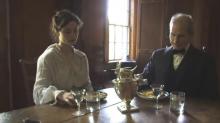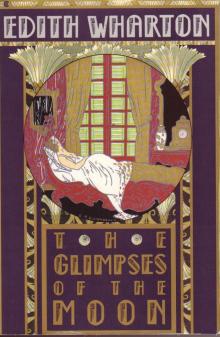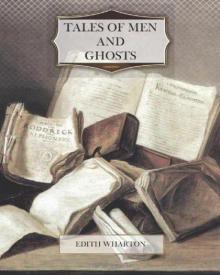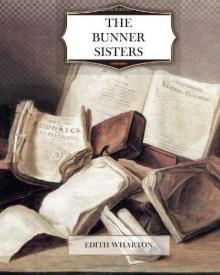- Home
- Edith Wharton
The Fruit of the Tree Page 4
The Fruit of the Tree Read online
Page 4
IV
JOHN AMHERST was no one-sided idealist. He felt keenly the growingcomplexity of the relation between employer and worker, the seeminghopelessness of permanently harmonizing their claims, the recurringnecessity of fresh compromises and adjustments. He hated rant, demagogy,the rash formulating of emotional theories; and his contempt for badlogic and subjective judgments led him to regard with distrust thepanaceas offered for the cure of economic evils. But his heart achedfor the bitter throes with which the human machine moves on. He felt themenace of industrial conditions when viewed collectively, theirpoignancy when studied in the individual lives of the toilers among whomhis lot was cast; and clearly as he saw the need of a philosophic surveyof the question, he was sure that only through sympathy with itspersonal, human side could a solution be reached. The disappearance ofthe old familiar contact between master and man seemed to him one of thegreat wrongs of the new industrial situation. That the breach must befarther widened by the ultimate substitution of the stock-company forthe individual employer--a fact obvious to any student of economictendencies--presented to Amherst's mind one of the most painful problemsin the scheme of social readjustment. But it was characteristic of himto dwell rather on the removal of immediate difficulties than in thecontemplation of those to come, and while the individual employer wasstill to be reckoned with, the main thing was to bring him closer to hisworkers. Till he entered personally into their hardships andaspirations--till he learned what they wanted and why they wantedit--Amherst believed that no mere law-making, however enlightened, couldcreate a wholesome relation between the two.
This feeling was uppermost as he sat with Mrs. Westmore in the carriagewhich was carrying them to the mills. He had meant to take the trolleyback to Westmore, but at a murmured word from Mr. Tredegar Bessy hadoffered him a seat at her side, leaving others to follow. Thisculmination of his hopes--the unlooked-for chance of a half-hour alonewith her--left Amherst oppressed with the swiftness of the minutes. Hehad so much to say--so much to prepare her for--yet how begin, while hewas in utter ignorance of her character and her point of view, and whileher lovely nearness left him so little chance of perceiving anythingexcept itself?
But he was not often the victim of his sensations, and presently thereemerged, out of the very consciousness of her grace and hercompleteness, a clearer sense of the conditions which, in a measure, hadgone to produce them. Her dress could not have hung in such subtlefolds, her white chin have nestled in such rich depths of fur, thepearls in her ears have given back the light from such pure curves, ifthin shoulders in shapeless gingham had not bent, day in, day out, abovethe bobbins and carders, and weary ears throbbed even at night with thetumult of the looms. Amherst, however, felt no sensational resentment atthe contrast. He had lived too much with ugliness and want not tobelieve in human nature's abiding need of their opposite. He was gladthere was room for such beauty in the world, and sure that its purposewas an ameliorating one, if only it could be used as a beautiful spiritwould use it.
The carriage had turned into one of the nondescript thoroughfares, halfincipient street, half decaying lane, which dismally linked themill-village to Hanaford. Bessy looked out on the ruts, the hoardings,the starved trees dangling their palsied leaves in the radiant Octoberlight; then she sighed: "What a good day for a gallop!"
Amherst felt a momentary chill, but the naturalness of the exclamationdisarmed him, and the words called up thrilling memories of his owncollege days, when he had ridden his grandfather's horses in the famoushunting valley not a hundred miles from Hanaford.
Bessy met his smile with a glow of understanding. "You like riding too,I'm sure?"
"I used to; but I haven't been in the saddle for years. Factory managersdon't keep hunters," he said laughing.
Her murmur of embarrassment showed that she took this as an apologeticallusion to his reduced condition, and in his haste to correct thisimpression he added: "If I regretted anything in my other life, it wouldcertainly be a gallop on a day like this; but I chose my tradedeliberately, and I've never been sorry for my choice."
He had hardly spoken when he felt the inappropriateness of this avowal;but her prompt response showed him, a moment later, that it was, afterall, the straightest way to his end.
"You find the work interesting? I'm sure it must be. You'll think mevery ignorant--my husband and I came here so seldom...I feel as if Iought to know so much more about it," she explained.
At last the note for which he waited had been struck. "Won't you tryto--now you're here? There's so much worth knowing," he broke outimpetuously.
Mrs. Westmore coloured, but rather with surprise than displeasure. "I'mvery stupid--I've no head for business--but I will try to," she said.
"It's not business that I mean; it's the personal relation--just thething the business point of view leaves out. Financially, I don'tsuppose your mills could be better run; but there are over seven hundredwomen working in them, and there's so much to be done, just for them andtheir children."
He caught a faint hint of withdrawal in her tone. "I have alwaysunderstood that Mr. Truscomb did everything----"
Amherst flushed; but he was beyond caring for the personal rebuff. "Doyou leave it to your little girl's nurses to do everything for her?" heasked.
Her surprise seemed about to verge on annoyance: he saw the preliminaryruffling of the woman who is put to the trouble of defending herdignity. "Really, I don't see--" she began with distant politeness; thenher face changed and melted, and again her blood spoke for her beforeher lips.
"I am glad you told me that, Mr. Amherst. Of course I want to dowhatever I can. I should like you to point out everything----"
Amherst's resolve had been taken while she spoke. He _would_ point outeverything, would stretch his opportunity to its limit. All thoughts ofpersonal prudence were flung to the winds--her blush and tone had routedthe waiting policy. He would declare war on Truscomb at once, and takethe chance of dismissal. At least, before he went he would have broughtthis exquisite creature face to face with the wrongs from which herluxuries were drawn, and set in motion the regenerating impulses ofindignation and pity. He did not stop to weigh the permanent advantageof this course. His only feeling was that the chance would never againbe given him--that if he let her go away, back to her usual life, witheyes unopened and heart untouched, there would be no hope of her everreturning. It was far better that he should leave for good, and that sheshould come back, as come back she must, more and more often, if onceshe could be made to feel the crying need of her presence.
But where was he to begin? How give her even a glimpse of the packed andintricate situation?
"Mrs. Westmore," he said, "there's no time to say much now, but beforewe get to the mills I want to ask you a favour. If, as you go throughthem, you see anything that seems to need explaining, will you let mecome and tell you about it tonight? I say tonight," he added, meetingher look of enquiry, "because later--tomorrow even--I might not have thechance. There are some things--a good many--in the management of themills that Mr. Truscomb doesn't see as I do. I don't mean businessquestions: wages and dividends and so on--those are out of my province.I speak merely in the line of my own work--my care of the hands, andwhat I believe they need and don't get under the present system.Naturally, if Mr. Truscomb were well, I shouldn't have had this chanceof putting the case to you; but since it's come my way, I must seize itand take the consequences."
Even as he spoke, by a swift reaction of thought, those consequencesrose before him in all their seriousness. It was not only, or chiefly,that he feared to lose his place; though he knew his mother had notspoken lightly in instancing the case of the foreman whom Truscomb, togratify a personal spite, had for months kept out of a job in his trade.And there were special reasons why Amherst should heed her warning. Inadopting a manual trade, instead of one of the gentlemanly professionswhich the men of her family had always followed, he had not onlydisappointed her hopes, and to a great extent thrown away the benefitsof the educa
tion she had pinched herself to give him, but had disturbedall the habits of her life by removing her from her normal surroundingsto the depressing exile of a factory-settlement. However much he blamedhimself for exacting this sacrifice, it had been made so cheerfully thatthe consciousness of it never clouded his life with his mother; but herself-effacement made him the more alive to his own obligations, andhaving placed her in a difficult situation he had always been carefulnot to increase its difficulties by any imprudence in his conduct towardhis employers. Yet, grave as these considerations were, they were reallyless potent than his personal desire to remain at Westmore. Lightly ashe had just resolved to risk the chance of dismissal, all his future wasbound up in the hope of retaining his place. His heart was in the workat Westmore, and the fear of not being able to get other employment wasa small factor in his intense desire to keep his post. What he reallywanted was to speak out, and yet escape the consequences: by somemiraculous reversal of probability to retain his position and yet effectTruscomb's removal. The idea was so fantastic that he felt it merely asa quickening of all his activities, a tremendous pressure of will alongundetermined lines. He had no wish to take the manager's place; but hisdream was to see Truscomb superseded by a man of the new school, insympathy with the awakening social movement--a man sufficientlypractical to "run" the mills successfully, yet imaginative enough toregard that task as the least of his duties. He saw the promise of sucha man in Louis Duplain, the overseer who boarded with Mrs. Amherst: ayoung fellow of Alsatian extraction, a mill-hand from childhood, who hadworked at his trade in Europe as well as in America, and who united withmore manual skill, and a greater nearness to the workman's standpoint,all Amherst's enthusiasm for the experiments in social betterment thatwere making in some of the English and continental factories. Hisstrongest wish was to see such a man as Duplain in control at Westmorebefore he himself turned to the larger work which he had begun to seebefore him as the sequel to his factory-training.
All these thoughts swept through him in the instant's pause before Mrs.Westmore, responding to his last appeal, said with a graceful eagerness:"Yes, you must come tonight. I want to hear all you can tell me--and ifthere is anything wrong you must show me how I can make it better."
"I'll show her, and Truscomb shan't turn me out for it," was the vow hepassionately registered as the carriage drew up at the office-door ofthe main building.
How this impossible result was to be achieved he had no farther time toconsider, for in another moment the rest of the party had entered thefactory with them, and speech was followed up in the roar of themachinery.
Amherst's zeal for his cause was always quickened by the sight of themills in action. He loved the work itself as much as he hated theconditions under which it was done; and he longed to see on theoperatives' faces something of the ardour that lit up his own when heentered the work-rooms. It was this passion for machinery that at schoolhad turned him from his books, at college had drawn him to the coursesleast in the line of his destined profession; and it always seized onhim afresh when he was face to face with the monstrous energies of themills. It was not only the sense of power that thrilled him--he felt abeauty in the ordered activity of the whole intricate organism, in therhythm of dancing bobbins and revolving cards, the swift continuousoutpour of doublers and ribbon-laps, the steady ripple of the longply-frames, the terrible gnashing play of the looms--all these varyingsubordinate motions, gathered up into the throb of the great engineswhich fed the giant's arteries, and were in turn ruled by the invisibleaction of quick thought and obedient hands, always produced in Amherst aresponsive rush of life.
He knew this sensation was too specialized to affect his companions; buthe expected Mrs. Westmore to be all the more alive to the otherside--the dark side of monotonous human toil, of the banquet of fleshand blood and brain perpetually served up to the monster whoseinsatiable jaws the looms so grimly typified. Truscomb, as he had toldher, was a good manager from the profit-taking standpoint. Since it wasprofitable to keep the machinery in order, he maintained throughout thefactory a high standard of mechanical supervision, except where one ortwo favoured overseers--for Truscomb was given to favoritism--shirkedthe duties of their departments. But it was of the essence of Truscomb'spolicy--and not the least of the qualities which made him a "paying"manager--that he saved money scrupulously where its outlay would nothave resulted in larger earnings. To keep the floors scrubbed, thecotton-dust swept up, the rooms freshly whitewashed and well-ventilated,far from adding the smallest fraction to the quarterly dividends, wouldhave deducted from them the slight cost of this additional labour; andTruscomb therefore economized on scrubbers, sweepers and window-washers,and on all expenses connected with improved ventilation and otherhygienic precautions. Though the whole factory was over-crowded, thenewest buildings were more carefully planned, and had the usual sanitaryimprovements; but the old mills had been left in their original state,and even those most recently built were fast lapsing into squalor. Itwas no wonder, therefore, that workers imprisoned within such wallsshould reflect their long hours of deadening toil in dull eyes andanaemic skins, and in the dreary lassitude with which they bent to theirtasks.
Surely, Amherst argued, Mrs. Westmore must feel this; must feel it allthe more keenly, coming from an atmosphere so different, from a lifewhere, as he instinctively divined, all was in harmony with her owngraceful person. But a deep disappointment awaited him. He was stillunder the spell of their last moments in the carriage, when her face andvoice had promised so much, when she had seemed so deeply, if vaguely,stirred by his appeal. But as they passed from one resounding room tothe other--from the dull throb of the carding-room, the groan of theply-frames, the long steady pound of the slashers, back to the angryshriek of the fierce unappeasable looms--the light faded from her eyesand she looked merely bewildered and stunned.
Amherst, hardened to the din of the factory, could not measure itseffect on nerves accustomed to the subdued sounds and spaciousstillnesses which are the last refinement of luxury. Habit had made himunconscious of that malicious multiplication and subdivision of noisethat kept every point of consciousness vibrating to a different note, sothat while one set of nerves was torn as with pincers by the dominantscream of the looms, others were thrilled with a separate pain by theceaseless accompaniment of drumming, hissing, grating and crashing thatshook the great building. Amherst felt this tumult only as part of theatmosphere of the mills; and to ears trained like his own he could makehis voice heard without difficulty. But his attempts at speech wereunintelligible to Mrs. Westmore and her companions, and after vainlytrying to communicate with him by signs they hurried on as if to escapeas quickly as possible from the pursuing whirlwind.
Amherst could not allow for the depressing effect of this enforcedsilence. He did not see that if Bessy could have questioned him thecurrents of sympathy might have remained open between them, whereas,compelled to walk in silence through interminable ranks of meaninglessmachines, to which the human workers seemed mere automatic appendages,she lost all perception of what the scene meant. He had forgotten, too,that the swift apprehension of suffering in others is as much the resultof training as the immediate perception of beauty. Both perceptions maybe inborn, but if they are not they can be developed only through thediscipline of experience.
"That girl in the hospital would have seen it all," he reflected, as thevision of Miss Brent's small incisive profile rose before him; but thenext moment he caught the light on Mrs. Westmore's hair, as she bentabove a card, and the paler image faded like a late moon in the sunrise.
Meanwhile Mrs. Ansell, seeing that the detailed inspection of thebuildings was as trying to Mr. Langhope's lameness as to his daughter'snerves, had proposed to turn back with him and drive to Mrs. Amherst's,where he might leave her to call while the others were completing theirrounds. It was one of Mrs. Ansell's gifts to detect the first symptomsof _ennui_ in her companions, and produce a remedy as patly as oldladies whisk out a scent-bottle or a cough-lozenge; and Mr. Lan
ghope'slook of relief showed the timeliness of her suggestion.
Amherst was too preoccupied to wonder how his mother would take thisvisit; but he welcomed Mr. Langhope's departure, hoping that thewithdrawal of his ironic smile would leave his daughter open to gentlerinfluences. Mr. Tredegar, meanwhile, was projecting his dry glance overthe scene, trying to converse by signs with the overseers of thedifferent rooms, and pausing now and then to contemplate, not so muchthe workers themselves as the special tasks which engaged them.
How these spectators of the party's progress were affected by Mrs.Westmore's appearance, even Amherst, for all his sympathy with theirviews, could not detect. They knew that she was the new owner, that adisproportionate amount of the result of their toil would in future passthrough her hands, spread carpets for her steps, and hang a setting ofbeauty about her eyes; but the knowledge seemed to produce no specialinterest in her personality. A change of employer was not likely to makeany change in their lot: their welfare would probably continue to dependon Truscomb's favour. The men hardly raised their heads as Mrs. Westmorepassed; the women stared, but with curiosity rather than interest; andAmherst could not tell whether their sullenness reacted on Mrs.Westmore, or whether they were unconsciously chilled by herindifference. The result was the same: the distance between them seemedto increase instead of diminishing; and he smiled ironically to think ofthe form his appeal had taken--"If you see anything that seems to needexplaining." Why, she saw nothing--nothing but the greasy floor underher feet, the cotton-dust in her eyes, the dizzy incomprehensiblewhirring of innumerable belts and wheels! Once out of it all, she wouldmake haste to forget the dreary scene without pausing to ask for anyexplanation of its dreariness.
In the intensity of his disappointment he sought a pretext to cut shortthe tour of the buildings, that he might remove his eyes from the facehe had so vainly watched for any sign of awakening. And then, as hedespaired of it, the change came.
They had entered the principal carding-room, and were half-way down itslong central passage, when Mr. Tredegar, who led the procession, pausedbefore one of the cards.
"What's that?" he asked, pointing to a ragged strip of black cloth tiedconspicuously to the frame of the card.
The overseer of the room, a florid young man with dissipated eyes, who,at Amherst's signal, had attached himself to the party, stopped shortand turned a furious glance on the surrounding operatives.
"What in hell...? It's the first I seen of it," he exclaimed, making anineffectual attempt to snatch the mourning emblem from its place.
At the same instant the midday whistle boomed through the building, andat the signal the machinery stopped, and silence fell on the mills. Themore distant workers at once left their posts to catch up the hats andcoats heaped untidily in the corners; but those nearer by, attracted bythe commotion around the card, stood spell-bound, fixing the visitorswith a dull stare.
Amherst had reddened to the roots of his hair. He knew in a flash whatthe token signified, and the sight stirred his pity; but it also jarredon his strong sense of discipline, and he turned sternly to theoperatives.
"What does this mean?"
There was a short silence; then one of the hands, a thin bent man withmystic eyes, raised his head and spoke.
"We done that for Dillon," he said.
Amherst's glance swept the crowded faces. "But Dillon was not killed,"he exclaimed, while the overseer, drawing out his pen-knife, ripped offthe cloth and tossed it contemptuously into a heap of cotton-refuse athis feet.
"Might better ha' been," came from another hand; and a deep "That's so"of corroboration ran through the knot of workers.
Amherst felt a touch on his arm, and met Mrs. Westmore's eyes. "What hashappened? What do they mean?" she asked in a startled voice.
"There was an accident here two days ago: a man got caught in the cardbehind him, and his right hand was badly crushed."
Mr. Tredegar intervened with his dry note of command. "How serious isthe accident? How did it happen?" he enquired.
"Through the man's own carelessness--ask the manager," the overseerinterposed before Amherst could answer.
A deep murmur of dissent ran through the crowd, but Amherst, withoutnoticing the overseer's reply, said to Mr. Tredegar: "He's at the HopeHospital. He will lose his hand, and probably the whole arm."
He had not meant to add this last phrase. However strongly hissympathies were aroused, it was against his rule, at such a time, to sayanything which might inflame the quick passions of the workers: he hadmeant to make light of the accident, and dismiss the operatives with asharp word of reproof. But Mrs. Westmore's face was close to his: he sawthe pity in her eyes, and feared, if he checked its expression, that hemight never again have the chance of calling it forth.
"His right arm? How terrible! But then he will never be able to workagain!" she exclaimed, in all the horror of a first confrontation withthe inexorable fate of the poor.
Her eyes turned from Amherst and rested on the faces pressing about her.There were many women's faces among them--the faces of faggedmiddle-age, and of sallow sedentary girlhood. For the first time Mrs.Westmore seemed to feel the bond of blood between herself and these dimcreatures of the underworld: as Amherst watched her the lovely miraclewas wrought. Her pallour gave way to a quick rush of colour, her eyeswidened like a frightened child's, and two tears rose and rolled slowlydown her face.
"Oh, why wasn't I told? Is he married? Has he children? What does itmatter whose fault it was?" she cried, her questions pouring outdisconnectedly on a wave of anger and compassion.
"It warn't his fault.... The cards are too close.... It'll happenagain.... He's got three kids at home," broke from the operatives; andsuddenly a voice exclaimed "Here's his wife now," and the crowd dividedto make way for Mrs. Dillon, who, passing through the farther end of theroom, had been waylaid and dragged toward the group.
She hung back, shrinking from the murderous machine, which she beheldfor the first time since her husband's accident; then she saw Amherst,guessed the identity of the lady at his side, and flushed up to herhaggard forehead. Mrs. Dillon had been good-looking in her earlieryouth, and sufficient prettiness lingered in her hollow-cheeked face toshow how much more had been sacrificed to sickness and unwholesome toil.
"Oh, ma'am, ma'am, it warn't Jim's fault--there ain't a steadier manliving. The cards is too crowded," she sobbed out.
Some of the other women began to cry: a wave of sympathy ran throughthe circle, and Mrs. Westmore moved forward with an answeringexclamation. "You poor creature...you poor creature...." She opened herarms to Mrs. Dillon, and the scrubber's sobs were buried on heremployer's breast.
"I will go to the hospital--I will come and see you--I will see thateverything is done," Bessy reiterated. "But why are you here? How is itthat you have had to leave your children?" She freed herself to turn areproachful glance on Amherst. "You don't mean to tell me that, at sucha time, you keep the poor woman at work?"
"Mrs. Dillon has not been working here lately," Amherst answered. "Themanager took her back to-day at her own request, that she might earnsomething while her husband was in hospital."
Mrs. Westmore's eyes shone indignantly. "Earn something? But surely----"
She met a silencing look from Mr. Tredegar, who had stepped between Mrs.Dillon and herself.
"My dear child, no one doubts--none of these good people doubt--that youwill look into the case, and do all you can to alleviate it; but let mesuggest that this is hardly the place----"
She turned from him with an appealing glance at Amherst.
"I think," the latter said, as their eyes met, "that you had better letme dismiss the hands: they have only an hour at midday."
She signed her assent, and he turned to the operatives and said quietly:"You have heard Mrs. Westmore's promise; now take yourselves off, andgive her a clear way to the stairs."
They dropped back, and Mr. Tredegar drew Bessy's arm through his; but ashe began to move away she turned and laid her han
d on Mrs. Dillon'sshoulder.
"You must not stay here--you must go back to the children. I will makeit right with Mr. Truscomb," she said in a reassuring whisper; then,through her tears, she smiled a farewell at the lingering knot ofoperatives, and followed her companions to the door.
In silence they descended the many stairs and crossed the shabbyunfenced grass-plot between the mills and the manager's office. It wasnot till they reached the carriage that Mrs. Westmore spoke.
"But Maria is waiting for us--we must call for her!" she said, rousingherself; and as Amherst opened the carriage-door she added: "You willshow us the way? You will drive with us?"
During the drive Bessy remained silent, as if re-absorbed in thedistress of the scene she had just witnessed; and Amherst found himselfautomatically answering Mr. Tredegar's questions, while his own mindhad no room for anything but the sense of her tremulous lips and of hereyes enlarged by tears. He had been too much engrossed in the momentousissues of her visit to the mills to remember that she had promised tocall at his mother's for Mrs. Ansell; but now that they were on theirway thither he found himself wishing that the visit might have beenavoided. He was too proud of his mother to feel any doubt of theimpression she would produce; but what would Mrs. Westmore think oftheir way of living, of the cheap jauntiness of the cottage, and thesmell of cooking penetrating all its thin partitions? Duplain, too,would be coming in for dinner; and Amherst, in spite of his liking forthe young overseer, became conscious of a rather overbearing freedom inhis manner, the kind of misplaced ease which the new-made Americanaffects as the readiest sign of equality. All these trifles, usuallynon-existent or supremely indifferent to Amherst, now assumed a suddenimportance, behind which he detected the uneasy desire that Mrs.Westmore should not regard him as less of her own class than hisconnections and his bringing-up entitled him to be thought. In a flashhe saw what he had forfeited by his choice of a calling--equal contactwith the little circle of people who gave life its crowning grace andfacility; and the next moment he was blushing at this reversal of hisstandards, and wondering, almost contemptuously, what could be thenature of the woman whose mere presence could produce such a change.
But there was no struggling against her influence; and as, the nightbefore, he had looked at Westmore with the nurse's eyes, so he now foundhimself seeing his house as it must appear to Mrs. Westmore. He noticedthe shabby yellow paint of the palings, the neglected garden of theirneighbour, the week's wash flaunting itself indecently through thedenuded shrubs about the kitchen porch; and as he admitted hiscompanions to the narrow passage he was assailed by the expected whiffof "boiled dinner," with which the steam of wash-tubs was intimatelymingled.
Duplain was in the passage; he had just come out of the kitchen, and thefact that he had been washing his hands in the sink was made evident byhis rolled-back shirt-sleeves, and by the shiny redness of the knuckleshe was running through his stiff black hair.
"Hallo, John," he said, in his aggressive voice, which rose abruptly atsight of Amherst's companions; and at the same moment the frowsymaid-of-all-work, crimson from stooping over the kitchen stove, thrusther head out to call after him: "See here, Mr. Duplain, don't you leaveyour cravat laying round in my dough."

 The Age of Innocence
The Age of Innocence The Reef
The Reef Summer
Summer The Glimpses of the Moon
The Glimpses of the Moon Xingu
Xingu The Fruit of the Tree
The Fruit of the Tree Fast and Loose
Fast and Loose Artemis to Actaeon and Other Verse
Artemis to Actaeon and Other Verse The Line of Least Resistance
The Line of Least Resistance The Lamp of Psyche
The Lamp of Psyche The Reckoning
The Reckoning Afterward
Afterward The New York Stories of Edith Wharton
The New York Stories of Edith Wharton The 2014 Halloween Horrors Megapack
The 2014 Halloween Horrors Megapack 'Copy': A Dialogue
'Copy': A Dialogue The Recovery
The Recovery The Fulness of Life
The Fulness of Life Early Short Stories Vol. 1
Early Short Stories Vol. 1 Tales of Men and Ghosts
Tales of Men and Ghosts The House of the Dead Hand
The House of the Dead Hand That Good May Come
That Good May Come The Buccaneers
The Buccaneers Other Times, Other Manners
Other Times, Other Manners The Hermit and the Wild Woman
The Hermit and the Wild Woman Kerfol
Kerfol The Duchess at Prayer
The Duchess at Prayer Bunner Sisters
Bunner Sisters The Choice
The Choice Madame De Treymes
Madame De Treymes Ethan Frome, Summer, Bunner Sisters
Ethan Frome, Summer, Bunner Sisters In Morocco
In Morocco The Valley of Decision
The Valley of Decision Age of Innocence (Barnes & Noble Classics Series)
Age of Innocence (Barnes & Noble Classics Series) The Angel at the Grave
The Angel at the Grave April Showers
April Showers Sanctuary
Sanctuary The Bunner Sisters
The Bunner Sisters Mrs. Manstey's View
Mrs. Manstey's View Writing a War Story
Writing a War Story The Custom of the Country
The Custom of the Country In Trust
In Trust The Triumph of the Night
The Triumph of the Night The Hermit and the Wild Woman, and Other Stories
The Hermit and the Wild Woman, and Other Stories Roman Fever and Other Stories
Roman Fever and Other Stories The Mission of Jane
The Mission of Jane The Descent of Man and Other Stories
The Descent of Man and Other Stories Coming Home
Coming Home The Touchstone
The Touchstone Early Short Stories Vol. 2
Early Short Stories Vol. 2 Edith Wharton's Verse, 1879-1919, from various journals.
Edith Wharton's Verse, 1879-1919, from various journals.